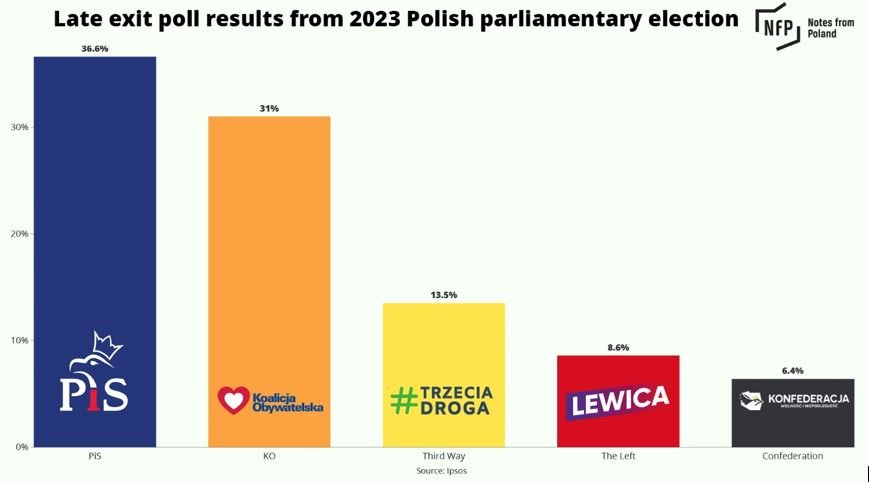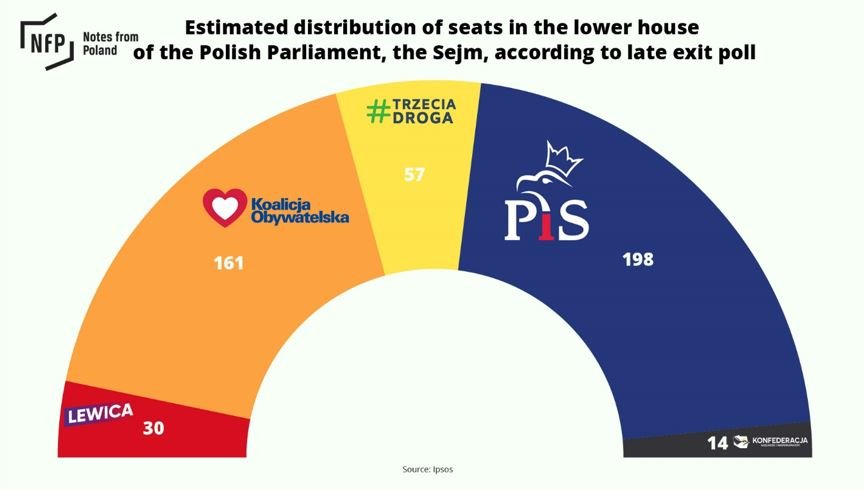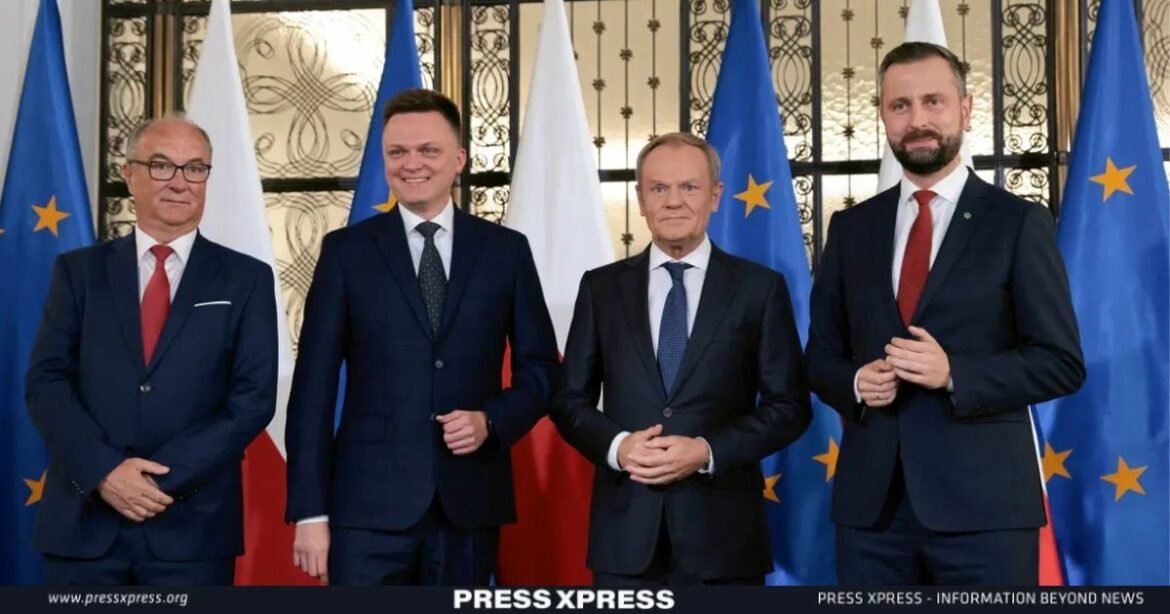Donald Tusk’s opposition alliance has a solid majority in parliament and is ready for government duties. However, PiS election loser Mateusz Morawiecki has been selected to form a government instead
In the wake of last month’s (October 2023) parliamentary elections in Poland, the opposition has forged a coalition agreement, signaling their intent to establish a new government. The Civic Coalition, led by Donald Tusk, a centrist force, inked the deal in parliament alongside two other groups. Although the pro-European Union opposition secured a comfortable majority in the October vote, the intricate process of government formation lies ahead.
You can also read: American Democracy is not Safe in America
The Law and Justice party (PiS), the ruling right-wing nationalist faction, has been granted the initial opportunity to form a coalition. President Andrzej Duda assigned this task to incumbent Prime Minister Mateusz Morawiecki, considering PiS’s triumph as the largest party in the October 15 vote.
Despite winning 194 out of the 460 seats in the Sejm, Poland’s parliament, PiS faces a daunting challenge in securing coalition partners, as other parties have categorically ruled out collaboration with Law and Justice. The opposition, with 248 seats, holds the majority and is poised to take control.


Donald Tusk’s Policy Goals Outlined in Coalition Agreement
In a symbolic move, the Civic Coalition, in conjunction with the agrarian conservative Third Way party and the New Left, formalized the coalition agreement in the Sejm on Friday 10th November 2023, just ahead of the parliament’s inaugural session on November 13. Their nominee for prime minister is Donald Tusk, the former European Council chief and leader of the Civic Coalition.
Donald Tusk expressed the coalition’s readiness to shoulder responsibility for Poland’s governance in the coming years. The coalition deal outlines comprehensive policy objectives, emphasizing the reinforcement of Poland’s standing in the EU and NATO, and prioritizing security in the context of Russia’s conflict in Ukraine.
Furthermore, the coalition commits to alleviating political influence on Poland’s judiciary, reversing a 2020 abortion ruling, separating Church and State, and depoliticizing state media, the military, and special services.
Polish Opposition led by Donald Tusk’s Grapples with Unity
Wladyslaw Kosiniak-Kamysz, leader of the center-right Polish Peasants’ Party, highlighted the common ground found in the agreement, reflecting a united front on the issues to be addressed.
However, within the pro-Tusk bloc, dissonance exists, with the Together party expressing reluctance to officially participate in the coalition. Their reservations revolve around the perceived inadequacy of the coalition’s stance on issues such as abortion liberalization, healthcare, and education spending.
As the opposition seeks to underscore its readiness to govern, the looming parliamentary session on November 13 is a crucial juncture. President Duda, allied with PiS, faces the challenge of navigating the coalition dynamics, as the right-wing nationalists fall short of the required seats.
The subsequent procedural steps involve the swearing-in of MPs and parliamentary speakers on Monday, leading to the resignation of Prime Minister Morawiecki and his government, which will continue as a caretaker until a new government is formed. However, the intricate process may extend over a month or longer.
Donald Tusk’s Path Forward and Potential Hurdles
As the current government resigns on Monday (13th November), a caretaker government will take its place until a new administration is formed. The timeline remains uncertain, with a potential month-long process ahead. President Duda has 14 days to nominate a prime minister, and assuming Morawiecki fails, parliament may designate Tusk as the prime minister of a coalition government.
If Tusk assumes the prime ministership, he will lead a diverse coalition facing challenges on issues like the liberalization of Poland’s strict abortion laws, despite their shared pro-EU stance and commitment to judicial and media independence. The dynamics within the coalition will be tested as they navigate the intricacies of governance.
Poland’s competitive elections faced issues with the misuse of public resources
Poland’s recent parliamentary elections witnessed a significant surge in voter turnout and featured a diverse range of political choices. However, the campaign was marred by a troubling overlap between the ruling party’s messaging and government information campaigns, alongside biased coverage from the public broadcaster. International observers, including those from the OSCE, expressed concern over this interference, which tilted the playing field in favor of the ruling party, compromising the democratic separation of state and party.
Despite a polarized political atmosphere, the legal framework for the elections was deemed sufficient by the joint observation mission. Nevertheless, recent legal amendments, while incorporating some recommendations, lacked substantial public consultation and were implemented shortly before the elections. The campaign itself was marked by confrontational rhetoric, personal attacks, and a lack of transparency in decision-making processes.
The media landscape in Poland, though diverse, faced challenges with increasing political control. State-controlled entities acquired regional media outlets, attempts were made to limit foreign media ownership, and protracted license renewal processes indicated heightened government influence. Public television, while providing airtime to all contestants, exhibited bias in favor of the ruling party, contributing to a lack of media equality. Observers emphasized the importance of equality, inclusiveness, and transparency in election administration, noting that the ruling party gained an advantage through the misuse of state resources, further blurring the line between state and party. The international observation mission involved 154 observers from 44 countries.
Poland’s Election Signals Thaw with EU and Ukraine, Raises Moscow Concerns
The outcome of Poland’s recent election, characterized by a victory for liberal centrism, may elicit unease in Moscow. Despite the incumbent Law and Justice (PiS) party securing the highest percentage of the vote at 35.4%, opposition groups are poised to establish a parliamentary majority. The election, framed by Donald Tusk of the center-right Civic Platform party as an opportunity to reinstate democratic norms and liberal values after eight years of nationalist, socially conservative policies, signals a potential thaw in Poland’s relations with the EU and Ukraine.
Observers suggest that Moscow may not view favorably the decisive victory of political parties advocating a strong pro-EU and pro-Ukraine stance. Russia’s efforts to strengthen ties with nations like China and India contrast with the ongoing challenge posed by EU unity, which consistently supports sanctions against Russia and provides military and economic aid to Ukraine in its conflict with Russia.
Poland, boasting the fifth-largest economy and population in the EU, holds a significant geopolitical role as a NATO base with around 10,000 U.S. troops stationed within its borders. The country has played a crucial role in the refugee crisis, accepting over a million refugees from its ally Ukraine since the conflict’s onset.
In conclusion, Poland’s opposition, led by the Civic Coalition, has solidified a coalition deal signaling their intent to govern. Despite the majority secured in the October vote, the Law and Justice party (PiS) has the first chance to form a coalition, yet internal opposition unity remains strong. The coalition, spearheaded by Donald Tusk, sets ambitious policy goals but faces challenges due to internal dissent, particularly from the Together party. As the process unfolds, the opposition emphasizes readiness for governance, navigating through strategic delays and potential hurdles in the path to forming a new government.


